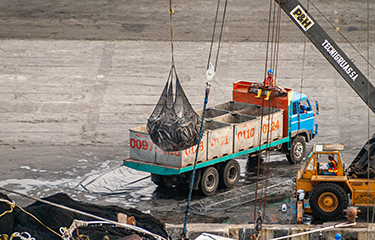Several environmental NGOs have expressed a combination of optimism and disappointment after the 100th meeting of the Inter-American Tropical Tuna Commission (IATTC), the international commission responsible for governing tuna stocks in the Eastern Pacific Ocean.
A number of NGOs advocating for sustainable fishing have observer status with a number of regional fishery management organizations (RFMO), allowing them to attend and participate in events like the recent IATTC meeting – which ended 5 August. Two such observers – the International Seafood Sustainability Foundation (ISSF) and the Global Tuna Alliance (GTA) – have both praised and criticized some of the latest decisions by the IATTC.
A top issue for the ISSF has been the use of fish aggregating device (FAD) design, something that ISSF Research Scientist Gala Moreno and ISSF Vice President of Policy and Outreach said the IATTC failed to address at the latest meeting – but the pair had praise for other important decisions.
“While we are disappointed that the Commission did not address our top ask on improved fish aggregating device designs, we are pleased that managers made headway on important topics like at-sea transshipment measures, harvest strategies, and compliance reforms,” they said.
FADs are a method of fishing for tuna using floating objects that fish like to gather under. The issue is that FADs made with netting can also entangle and kill sharks and sea turtles, and abandoned FADs snag on and damage coral reefs. All tuna RFMOs are now promoting non-entangling FAD designs, but the ISSF urged the IATTC to prohibit the use of any netting in the construction of FADs – as done by the Indian Ocean Tuna Commission (IOTC) and the Western and Central Pacific Fisheries Commission (WCPFC) – and to encourage fishers and vessel-owners to deploy a percentage of FADs made using biodegradable materials.
“Our most urgent appeal was that the Commission prohibit the use of netting in FADs and transition fleets to the increased use of biodegradable materials,” Moreno and Koehler said. “IATTC currently allows netting in FAD construction and has no agreed definition of biodegradable FADs. Disappointingly, there were no proposals to advance needed improvements in FAD designs at the IATTC meeting.”
The IATTC also did not act on an ISSF proposal on bycatch that included a requirement that all shark bycatch be landed whole.
“ISSF is disappointed that the Commission did not adopt better protections for sharks and other bycatch species in EPO purse seine and longline fisheries, especially stronger measures for the prevention of shark finning,” Moreno and Koehler said. “The Commission also failed to improve its observer coverage requirements — which fall short of the 100 percent coverage rate for small purse seine and longline tuna fisheries that ISSF and its partners have long promoted — even incrementally.”
Despite the criticism, the ISSF praised the IATTC for bringing more transparency to transshipments, as it will now require International Maritime Organization (IMO) numbers, electronic transmission of notifications and transshipment declarations, shortened reporting deadlines, and vessel monitoring systems (VMS) on carrier vessels, regardless of size.
The NGO also congratulated IATTC on committing to a harvest strategy for North Pacific albacore and welcomed reforms to compliance, which included the adoption of improved follow-up and reporting on identified infractions; greater detail in compliance reports; better presentation of data to facilitate reviews; development of improvement plans and capacity building; and mechanisms to identify patterns of infractions.
Another NGO with observer status, the GTA responded to the latest meeting with a more market-based perspective. The alliance, based in the Netherlands, consists of retailers and tuna supply-chain companies committed to realizing harvest strategies for tuna fisheries, avoiding IUU products, improving traceability and environmental sustainability, and progressing work on human rights in tuna fisheries. The organization claims that GTA Partners, who are retailers and tuna supply chain companies, handle 30 percent of all tuna produced globally.
The group praised the adoption of the transshipment measures proposed by the E.U., but complained that a proposal from Ecuador that would have increased observer coverage onboard longline vessels of 20 meters or more from 5 percent to 100 percent by 2026, was blocked by delegations from Asia.
“This was in spite of compromises that resulted in the proposed requirement for electronic or human monitoring onboard longline vessels to be set at just 10 percent,” the GTA said. “The GTA, who share the ambitious aim of 100 percent observer coverage, presented a joint declaration with [The Pew Charitable Trusts] in support of this proposal, but to no avail.”
GTA Director of Outreach and Engagement Albert Arthur said the NGO was “disappointed” by certain cooperating non-members (CPCs) blocking the observer proposal.
“We are somewhat disappointed by a few CPCs who want to avoid accountability by blocking improvements to observer coverage,” he said. Doing so would increase the credibility of tuna fisheries in the IATTC convention area and make it more viable for our Partners to do business in the area.
The GTA, like the ISSF, praised the adoption of a new harvest strategy for North Pacific albacore – an issue that was also pushed for by The Pew Charitable Trusts. However, a harvest control rule, a pre-agreed guideline that determines how much fishing can take place, was delayed to next year.
“The GTA are pleased with the progress made on improving the transparency of the tuna fishing industry in the eastern Pacific with the strengthened transshipment regulation, and with more members now opting into the Port State Measure,” GTA Director of Outreach and Engagement Albert Arthur said. “We’re also delighted to see a harvest strategy adopted for North Pacific albacore, building from last year’s progress.”
Arthur added that the GTA was pleased with the overall progress made by the IATTC, despite the observer coverage issue.
“We are impressed by the ambition, co-operation and sense of responsibility shown by the majority of IATTC delegations who understand the stakes and what the market is looking for,” he said.
Photo courtesy of Claudine Van Massenhove/Shutterstock







